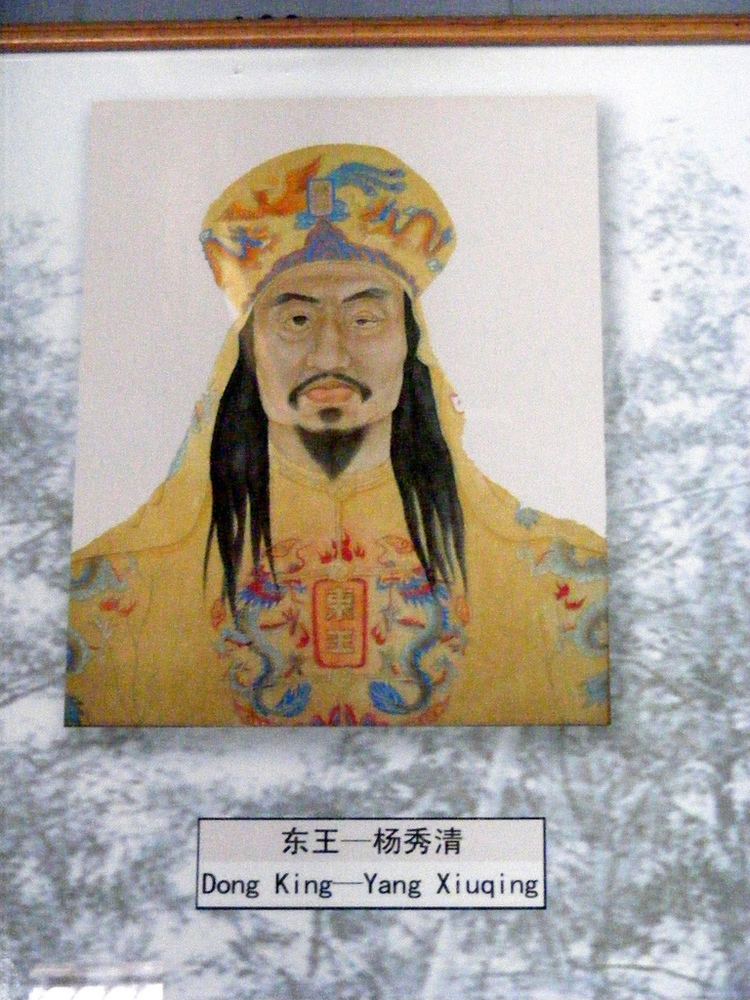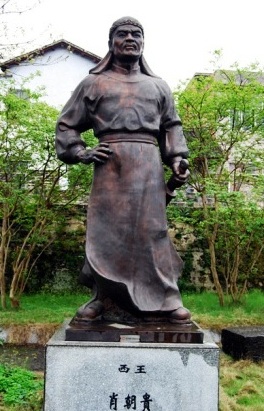<Back to Index>
- Commander - in - Chief of the Taiping Rebellion Yang Xiuqing, 1821
- Leader of the Taiping Rebellion Xiao Chaogui, 1820
PAGE SPONSOR

Yang Xiuqing (simplified Chinese: 杨秀清; traditional Chinese: 楊秀清; pinyin: Yáng Xiùqīng; Wade–Giles: Yang Hsiu-Ch'ing) (died September 2/3, 1856), was an organizer and commander-in-chief of the Taiping Rebellion.
Yang Xiuqing's family were farmers from Xincun near Jintian, Guangxi, but he lost his parents at a young age. According to imperial reports, Yang was a charcoal burner with some education who later organized a convoy system used to protect merchandise that was being transported through the area from bandits.
In April 1848, while Feng Yunshan and Hong Xiuquan were
in a neighboring province, Yang assumed a leadership role
in the God-Worshiping Society. Yang claimed to have been
stricken deaf and mute only to have regained his hearing
and speech at a meeting of the God Worshipers. He began to
claim that he could enter trances in which he would be
possessed by the Holy Spirit, allowing God the Father to
speak through him. It does not appear that Yang truly
believed that this was occurring, but that he instead
acted as such in service of his own ambitions, as while
speaking as God Feng necessarily possessed greater
authority than even Hong Xiuquan. Upon Hong and Feng's
return in the summer of 1849, they investigated Yang's
claims and recognized them as genuine. From May to
November 1850, Yang once again claimed to be deaf and
mute. Once he recovered, Yang alleged that God was angered
that Hong Xiuquan was not being allowed to establish the
kingdom of God on Earth and sought to punish mankind with
disease. According to this tale, only by suffering his
illness was Yang able to redeem others. In 1850, perhaps
in service of his political ambitions, he began to claim
that he could miraculously heal true believers.
He was an early participant in the rebellion and rose
quickly to prominence; in 1851, when Hong Xiuquan took the
title of Heavenly King for himself, he made Yang, in spite
of having no military knowledge or experience,
commander-in-chief of the army. Yang was further named
"East King", in keeping with three other leaders of the
rebellion who were given titles as "kings" of the four
quarters of the Heavenly Kingdom. In 1851, Yang announced
a vision in which it was revealed that there were traitors
in the highest levels of the movement, and two years later
that words of the Eastern King, that is, Yang himself,
were divine. He devised an extensive network of spies to
root out the intrigues of loyalists in the kingdom.
Shrewd, ruthless, and ambitious, Yang ultimately proved
himself to be a brilliant strategist and organizer, as
well as the administrative mastermind of the Taiping
Movement. By the 1850's, Yang had become the most powerful
leader of the Taiping Rebellion.
With this presumed divine guidance, Taiping troops
captured the city of Nanjing (Nanking), which became the
capital of the Heavenly Kingdom in 1853. Yang took control
of the city. He disciplined the troops after an initial
period of violence and slaughter by declaring that he
would execute any officer who entered a private home. City
residents were ordered to return to work. Men and women
were required to live separately, and were prohibited from
walking together or even speaking to each other (there
continued to be male and female military units). As Hong,
the Heavenly King, became less interested in politics and
more interested in his harem, he named Yang as prime
minister of the Heavenly Kingdom. Many of the basic laws
and regulations were issued during this period of Yang's
control.
In August 1856, Yang defeated the government troops
besieging Nanking. He first led them to divide their
forces by forcing them to send relief forces to other
cities, then sent all his own troops against them in a
massed attack. Arrogance over victory, however, led to his
downfall. Yang clashed with Hong over the rebellion's
policies and views toward Confucianism and iconoclasm;
Yang believed that Confucian morality was essentially
positive and that its basic tenets were compatible with
the rebellion's interpretation of Christianity and that
images of dragons were not sacrilegious. Hong, however,
rejected this notion and believed that Confucianism ought
to be eradicated, as it was the work of the devil.
Yang plotted to take the throne. Shortly before seeking a
title commiserate with Hong Xiuquan's, Yang dispatched Wei
Changhui, Shi Dakai, and Qin Rigang to separate provinces.
Hong, viewing Yang's request as treasonous, alerted the
three generals to return at once. Meanwhile, Yang demanded
to be called Wansui (Ten Thousand Years), a title reserved
for the emperor (Hong had assumed it in 1852). Wei
returned to Nanjing with three thousand troops on
September 1, 1856 and found that Qin Rigang had already
arrived. In consultation with Hong Xiuquan and his allies,
the two generals decided not to wait for Shi Dakai's
arrival. Instead, they and their troops immediately
stormed Yang's palace and slew him before he could escape.
They then slaughtered his family and followers within the
palace, despite having agreed with Hong that only Yang was
to die. At this point, six thousand of Yang's followers
remained in Nanjing. Yang's remaining followers in the
capital were all systemically slaughtered over the next
three months. Within a few years, the fortunes of the
Taiping Rebellion declined as the rebellion's leaders
became involved in the ensuing conspiracies and intrigues.

Xiao Chaogui (simplified Chinese: 萧朝贵; traditional Chinese: 蕭朝貴; pinyin: Xiāo Cháoguì ? – 1852) was an important leader during the early years of the Taiping Rebellion against the Qing dynasty of China. He was a sworn brother to Hong Xiuquan, the leader of the Taipings, and claimed to serve as a mouthpiece for Jesus Christ. Because of his importance to the rebellion, he was awarded the title of the "West King."
Xiao Chaogui was a poor peasant farmer from Wuxuan, now
part of Guiping, in the Thistle Mountain region of
Guangxi. Despite his modest means, he became an
influential leader in the region. He was probably a member
of the Hakka people, but it has also been suggested that
he was Yao. He may have been a relative of Yang Xiuqing.
He, along with his wife, father, and brothers, joined Hong
Xiuquan's Society of God Worshipers. He possessed a
"legendary reputation for valor and physical strength."
He was married to Yang Yunjiao, a zealous God Worshiper.
Yang claimed to have visited Heaven in 1837 during a
serious illness and to have been informed of the coming of
a religious instructor, who was later presumed to be Hong
Xiuquan.
Some sources have stated that, following the death of his
first wife, Xiao married Hong Xuanjiao, a younger sister
of Hong Xiuquan. This Hong Xuanjiao has left an imprint on
Chinese culture as a valiant female warrior. However, Hong
Xiuquan had no younger sister. Instead, it appears that
wives of Taiping Kings like Xiao Chaogu were referred to
as "younger sisters" of Hong Xiuquan. The most likely
explanation appears to be that Yang Yunjiao and Hong
Xuanjiao were the same person; Yang Yunjiao changed her
given name from Yunjiao to Xuanjiao (possibly due to
issues related to pronunciation), and folk historians
provided her with the surname Hong to honor Hong Xiaquan.
In the autumn of 1848, while Feng Yunshan and Hong
Xiuquan were in a neighboring province, Xiao Chaogui
assumed a leadership role in the God-Worshiping Society.
At this time, Xiao began to claim that Jesus Christ had
descended to earth and that Jesus spoke through him while
he himself was in a trance. This claim was ratified by
Hong Xiuquan and Feng Yunshan when the two returned to
Thistle Mountain the following summer. Xiao, speaking as
Jesus, provided doctrine, advice, and leadership to the
God Worshipers. When speaking as Jesus, Xiao was able to
reprimand even Hong Xiuquan, as Jesus necessarily
possessed greater authority than even Hong. During that
summer of 1848, Xiao entered into a sworn brotherhood with
Hong Xiuquan, Feng Yunshan, Yang Xiuqing, Wei Changhui,
Shi Dakai, and Jesus Christ.
Xiao acted as one of the principal military commanders of
the Taiping forces in the early days of the Taiping
Rebellion and was named commander in chief of the
Taiping's Front Army Corps on January 11, 1851. Shortly
after their capture of Yongan, Hong Xiuquan named Xiao
Co-Marshal, the ceremonial rank of marshal being the
"ultimate mark of distinction in the Taiping
organization." On December 4, 1851, Hong bestowed further
honors on Xiao, declaring him to be the West King, Lord of
8,000 Years. Six days later, during a Qing counterattack
on a supply depot near Yongan, Xiao was wounded. With one
minor exception, Xiao ceased to speak with the voice of
Jesus soon thereafter.
In the summer of 1852 while the Taiping were encamped in
Daozhou, three proclamations were issued by Xiao and Yang
Xiuqing (by then the East King of the Taipings) in an
attempt to gain the sympathy of the locals and to drum up
new recruits. These proclamations demonstrated the triune
religious - nationalist - political nature of the Taiping
Rebellion by calling for the conversion of the people to
Christianity, for the ruling ethnic minority Manchus to be
overthrown, and for the destruction of a government the
Taipings considered to be thoroughly corrupt. The
proclamations hardened the opposition of the gentry and
scholars but helped convince over 20,000 locals to join
the rebellion.
In late August 1852, Xiao lead a small force from
Chenzhou, the current base of the Taiping, in attempt to
capture the city of Changsha. They arrived at Changsha in
September and began besieging the city. Seeing little
progress being made, Xiao chose to don robes indicating
his noble rank, hoisted a large banner above his head, and
headed to the front lines to direct his troops. He was
quickly hit in the left shoulder by a cannonball fired
from the walls of the city and succumbed to his wounds
near the end of September. The siege was ultimately
abandoned in November. Xiao's actions leading up to his
death have been harshly condemned by Chinese historians,
who characterize them as "not an act of heroism but
another example of 'stupid loyalty and stupid valor.'"
Despite his death, Hong Xiuquan continued to regularly
issue decrees in his name. He was also posthumously
awarded the title "Rain Master." One of his sons inherited
his noble title and was addressed as Junior West King,
until his death in the aftermath of the fall of Nanjing.
Both sons were considered to be nephews to Jesus and
grandchildren to God.